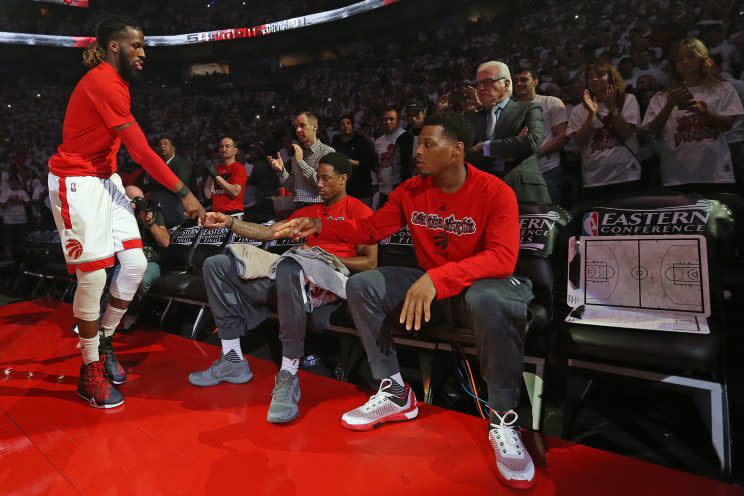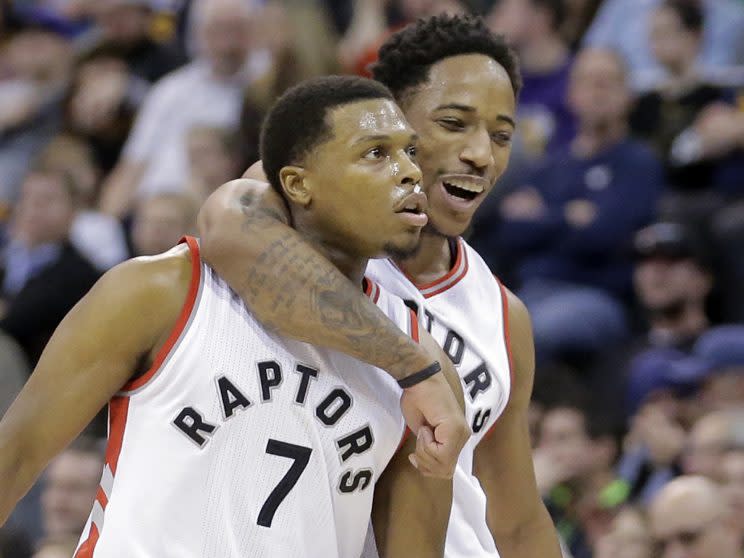DeMarre Carroll talks trouble in Toronto: 'A lot of guys didn't trust each other'

Two summers ago, the Toronto Raptors gave DeMarre Carroll a four-year, $60 million contract in the hope that he’d continue the individual development that made him one of the NBA’s top 3-and-D wings with the Atlanta Hawks, and that he’d help the Raptors become a team that could contend for an NBA Finals berth. Two days ago, the Raptors attached a lottery-protected first-round pick to Carroll to offload the final two years of his deal on the Brooklyn Nets.
[Fantasy Football is open! Sign up now]
Toronto has reached new heights, posting consecutive 50-win seasons and reaching the franchise’s first-ever Eastern Conference finals in 2016. But the weekend trade served as an acknowledgment that Carroll — limited by injury to just 26 appearances in his first year as a Raptor, rarely a facsimile of his pre-injury self last season — wasn’t the hoped-for two-way swingman who could propel the club further than that.
As such, when team president Masai Ujiri agreed to hefty deals to re-up Kyle Lowry and Serge Ibaka, it was Carroll’s eight-figure deal that wound up on the chopping block, shipped out so the Raptors could get within hailing distance of ducking the luxury tax and maintain some financial flexibility for the future. All things considered, though, it sounds like that’s just fine by the 30-year-old forward.
As Carroll told Ryan Wolstat of the Toronto Sun in his first post-trade interview, he felt frustrated at times by the Raptors’ insistence on an isolation-heavy offense in which the team’s All-Star backcourt dominated the proceedings rather than a “more team-oriented” style of ball like the one favored by the 60-win Hawks on which he played before heading north. And, to hear him tell it, he wasn’t alone:
Some players wanted to play a more free-flowing style, others were content to pile up regular season wins relying heavily on the team’s stars DeMar DeRozan and Kyle Lowry and, at times, there was a clash. […]
Carroll says DeRozan and Lowry are great players, so it’s difficult to stray from something that works (at least in the regular season).
“It’s hard to just change it all of a sudden. It’s a culture thing, you have to build it from the ground up and that’s what we did in Atlanta. We built the [culture] moving the ball and trusting each other,” he said.
“If you’ve been playing ISO ball so long, and that’s all you know, it’s going to be kind of hard. I think you have to bring certain guys in, certain coaches in, to really build that type of culture and I feel like Toronto is an ISO team, that’s what they win off [of], that’s what they’ve been playing off of for five, six years now.”
That the Raptors don’t exactly whip the ball around like the Warriors or Spurs is not breaking news, of course.
Dwane Casey’s club has ranked in the bottom half of the league in passes per game in each of the four years that the NBA has tracked the statistic, including a 27th-of-30-teams finish last season. In the two seasons for which NBA.com’s got Synergy Sports play-tracking data available, Toronto has ranked 10th and sixth in the league in the share of their offensive possessions that end with an isolation. The 2016-17 Raptors were dead last in the NBA in team assists, potential assists and points per game created by assist.
Even so, the Raptors’ offense was still really good last year. Toronto flirted with historic levels of efficiency early in the campaign before finishing the regular season a just-south-of-elite sixth in the NBA in points scored per possession. That success was fueled, in part, by a ton of free throws (sixth-most in the league) and a really low turnover rate (fifth-best in the NBA).
Those high points grew, in part, from the Raptors’ reliance on isolation play — only Cleveland produced more points per iso possession than the Raps — conducted mostly by Toronto’s stars. DeRozan was one of just six players in Basketball-Reference.com’s database to “use” more than one-third of his team’s offensive possessions for a full season and cough it up on 9 or fewer percent of them. Lowry combined 3-point and free-throw creation, and accuracy from both lines, to a similarly rare degree.
Get DeRozan and Lowry the ball, let them create, and reap the rewards. It’s a recipe that has worked for the Raptors during their rise through the East … until the playoffs start. Then, if Lowry and DeRozan start to struggle — and they have — trouble starts, and Toronto suddenly seems much easier to guard.

Toronto’s offensive efficiency mark dropped by 8.3 points-per-100 from the regular season to its Round 1 matchup against the Milwaukee Bucks, which the Raptors bounced back to win by going small after getting shellacked in Games 1 and 3, and barely hanging on in Games 2 and 4. It dropped by 8.9 points-per-100 from the regular season to Round 2 against Cleveland, a perfunctory four–game sweep in which the Raptors never even looked credibly competitive. In other words, Toronto’s once-near-historic offense became as toothless as Orlando’s or Philadelphia’s once the calendar flipped to mid-April.
Once again, the Raptors’ attack ran aground in the playoffs. Once again, Ujiri was left looking for answers — and this time, he focused on his team’s stylistic underpinnings.
“After that performance, we need a culture reset here,” Ujiri said. “[…] One of the things that I discussed with Coach Casey is how we play. We’ve done it the same time over and over again. Is it going to work the next time? We have to figure that out. The one-on-one basketball we play, we have to question that. The style of play is something that we need to change. I’ve made it clear, and Coach has acknowledged it, and he’s already thought about it. Just some of the things that we do, it’s not working anymore.”
It sounds like Ujiri and Carroll, then, are on the same page about what the Raptors need. (With the exception of whether they need Carroll, that is.) For his part, though, the forward will need to see Toronto stick to that allegedly revamped game plan before he believes it’s really here to stay. More from Wolstat:
“They say they’re going to try something different, I would love to see it [work]. It’s always good to do it,” he said […] “But once adversity hits and stuff starts going wrong, guys are going to go back to ISO basketball, that’s how it is. You’ve got to trust it. It’s one of those things you’ve got to build, you’ve just got to trust each other. This year, I feel like a lot of guys didn’t trust each other and a lot of guys, they didn’t feel like other guys could produce or [be] given the opportunity, so there was a lot of lack of trust on our team, so that’s what hindered us from going [as far as they wanted to go].”
Not content solely to voice his issues with the Raptors’ offensive approach, Carroll also aired grievances about Toronto’s defensive comportment during a Monday interview on Sportsnet 590 The Fan:
“Not really on the offensive end, but I think defensively. We have to trust each other in all aspects of the game, but I just felt like it wasn’t there,” he said on Prime Time Sports. “If one guy gets beat, there’s a clear lane to the goal, and somebody’s pointing to somebody else. It’s one of those things where, as a team, you have to move like you’re on a string – if one guy moves, the next guy moves. I just felt like we wasn’t on a string.”
You know, in retrospect, maybe the Raptors deserve a little more credit than we gave them after they bowed out to the Cavs. I mean, it’s got to be awful tough to win 51 games when nobody trusts each other on either end of the floor.
On the court, it seems a reasonable bet that the production of Carroll and outgoing backup point guard Cory Joseph can be adequately replaced by incoming swingman C.J. Miles and continued growth from young guards Norman Powell (the breakout star of the Raps’ first-round win over the Bucks) and Delon Wright (who’s been limited by injuries during his first two pro seasons, but who made real strides late last year). Other young players will also be counted on to contribute, and provide depth on a roster top-heavy with high-priced veteran talent. Second-year power forward Pascal Siakam, sophomore guard Fred VanVleet, (when healthy) 2017 first-round pick O.G. Anunoby and perhaps even forever-tantalizing physical specimen Bruno Caboclo, who’s spent the last three years in the D-League after his shocking 2014 first-round selection, could all wind up being counted on by season’s end.
If what Carroll’s saying is right, though, broader questions will define success in Toronto. Is Casey really committed to a more egalitarian offense? Are Lowry and DeRozan really on that same page? If they’re not — if they stop trusting their teammates and start breaking plays to call their own numbers — can Casey rein his All-Stars in? Can a team that just lost Carroll, P.J. Tucker and Patrick Patterson find enough of a sense of shared belief and continuity on the defensive end to stand a chance against the likes of the Cavs and Celtics? If the Raptors heed Ujiri’s call for a “culture reset,” they should be back into the conference finals mix. If they don’t, they could fade back toward the middle of the Eastern pack.
– – – – – – –
Dan Devine is an editor for Ball Don’t Lie on Yahoo Sports. Have a tip? Email him at devine@yahoo-inc.com or follow him on Twitter!


